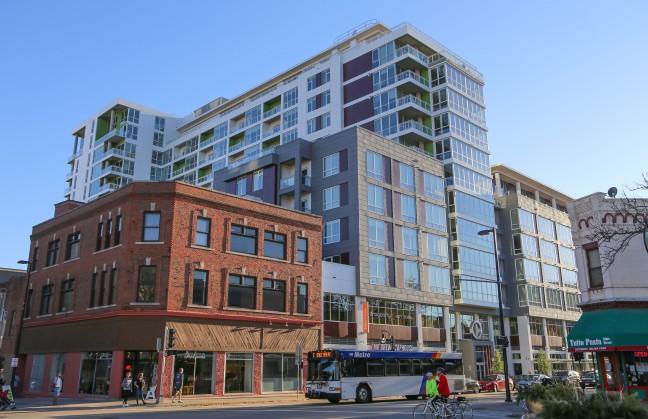Local non-profit organizations are working to provide assistance to minority populations in Madison who are disproportionately impacted by the pandemic.
Mayor Satya Rhodes-Conway announced $150,000 total in aid in July to three non-profit organizations — the African Center for Community Development, Freedom Inc. and UNIDOS Against Domestic Violence — to support immigrant households.
Freedom Inc. Co-Founder and Co-Executive Director Kabzuag Vaj works with low income, no-income, low-wage workers and queer, Black, South-East Asian women and young girls. Vaj said prior to the pandemic, this population was already disproportionately impacted by the government’s non-investment in their communities.
The pandemic highlighted issues within these communities, Vaj said.
“A lot of our folks are low-wage workers who are essential workers, and so while everybody is safe at home … practicing safer at home ordinances, we have moms who have to work because they’re essential workers, but then who’s taking care of the kids at home?” Vaj said.
Vaj said before the pandemic, Freedom Inc. was working with a population already impacted by disparities around poverty, housing and health. According to Vaj, many people were hoarding supplies in the beginning of the COVID-19 pandemic, but what they did not understand is poor people couldn’t afford to hoard.
Vaj said distance learning amplified inequities, particularly with students of color who came from predominantly poor families. Vaj said many did not have access to the internet or computers.
Wisconsin, UW chapters of College Democrats plan reforms to tackle internal racism
Vaj said they also work with people who experience intimate partner violence, or gender-based violence.
“We also had to figure out if they were safe at home due to domestic violence, or sexual abuse, neglect and all of these things because that’s the population that we work with,” Vaj said. “We went into high gear to not only meet their basic human essential needs, but to also figure out if people were safe.”
According to NPR, Hispanic or Latino individuals make up less than 10% of the total U.S. population but 37% of all COVID-19 cases in Wisconsin. To support Latinx households, UNIDOS Against Domestic Violence received $50,000 in aid from the City of Madison.
Executive Director for UNIDOS Against Domestic Violence Veronica Figueroa said UNIDOS provides hotel vouchers, rent assistance and aid with eviction prevention to victims of domestic violence because these populations need safe places to stay.
New COVID-19 Connect app provides information, support to Wisconsin residents
“We often end up having to find funding someplace else, whether that is our house or even our own family members for paying for hotel vouchers for people to go in until we kind of figure out how to or where to find a permanent housing situation for survivors,” Figueroa said.
Figueroa called the financial aid a “relief.”
Figueroa said COVID-19 increased violence in the Madison community, both in domestic violence and sexual assault, specifically in children. This increase happens every time there is a disaster, which is why it is necessary for them to be prepared to deal with an increase in violence.
Figueroa said it is important to continue to request elected officials come up with a plan and funding to help organizations like UNIDOS deal with situations and to sustain the programs.
The $50,000 in aid is still not enough in terms of housing, Figueroa said.
“With the relief funds that the county and the city and the state are receiving, making sure that those relief funds are being allocated across the board and just chunking the money to specific organizations, they should rather look at other organizations that are doing the work and spread that wealth among all of us to coordinate services,” Figueroa said.
According to Vaj, $50,000 in aid might seem a lot, but giving a thousand dollars to one family will only help 50 families, which is a very low number next to the large number of families that are financially affected by the pandemic.
Vaj said the government needs to figure out a collective response to the COVID-19 pandemic because it has the power and resources to keep people safe.
Student-athletes to wear black ‘W,’ show support for underrepresented students
Vaj said many organizations, including Freedom Inc., are turning to a mutual aid model, which she said is a part of people of color community models where POC help each other out. Vaj said a moratorium is not enough and Dane County needs to cancel rent.
“People who’ve had two household incomes now have one, and people who had one now have nothing, basically,” Vaj said. “[$50,000] is not even enough to keep 50 people off the street or to help them pay for rent so that they’re not homeless and getting evicted.”
Figueroa said there is a need for better strategies to deal with violence during disaster. Figueroa added people are aware this is not the first pandemic the world experienced and these situations are known to increase violence, but communities are still not prepared to deal with this rise.
According to Figueroa, instead addressing situations through a crisis-response approach, it is more effective to utilize prevention strategies because organizations cannot sustainably work in a crisis mode.
“Eventually, the whole philosophy will collapse if we continue to work on a crisis-basis every time one of our little ones gets shot and dies to then go and put a press release out there, or come out and do another March,” Figueroa said.
Figueroa said being proactive and cooperating within communities is necessary and different voices need to be heard. Elected officials can’t continue to make decisions without input from communities, Figueroa said.















